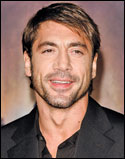Through interviews, Bardem's voiceover, action sequences and even animation, the Alvaro Longoria-helmed "Sons" shows how and why the Western Sahara, abandoned by Spain and annexed by Morocco in its 1975 Green March, became, according to a U.N. statement, a colony -- the last in Africa, noted Bardem -- leaving 200,000 Saharawis living in desert refugee camps, mostly in South-West Algeria.
Bardem and Longoria attended the 5th Sahara Film Festival in 2008, held in refugee camps.
"The only thing we know more or less how to do is make films, so we decided to make one on the Saharawi people, whose situation usually gets pushed to the back of political and diplomatic agendas," said Bardem.
They hardly knew what they were letting themselves in for.
Some of the most telling scenes in "Sons" document Bardem and Longoria's challenges in merely putting the documentary together.
It includes shaky covert footage of a Saharawi protest about living conditions in November 2010. "The Arab Spring really started there," said Bardem. Bardem is seen on the phone, attempting to tie down interviews in vain.
Despite four years of efforts, Bardem said no Moroccan was willing to go on the record about why the country has blocked a referendum, ordered by the United Nations, on Saharawi self-determination.
"We tried government officials, intellectuals: Everybody refused to speak," said Bardem.
"The difficulties we encountered serve as a metaphor for the reality of the Sahawaris," said Longoria.
Profits on the film will be sent to education or health orgs in the Western Sahara, he added.
"Sons" is produced by Bardem's Pinguin Films, Longoria's Morena Films and Candescent Films in the U.S.
Spain's Canal Plus has acquired "Sons," Longoria said.
Wild Bunch has struck pre-sales and will initiate a sales campaign in Berlin.
"But just opening in Berlin is big, more than we ever imagined," Bardem said.
Contact the Variety newsroom at news@variety.com






0 comments:
Post a Comment